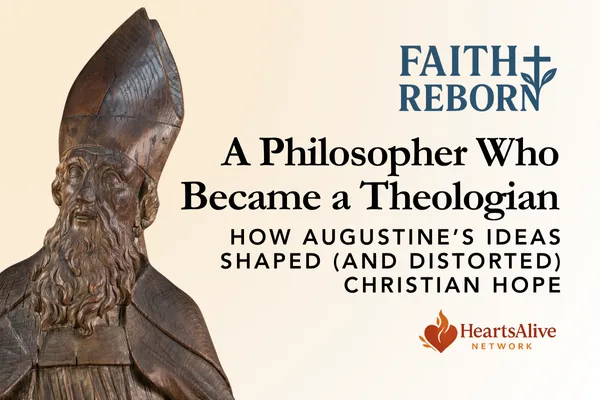
When a Trained Philosopher Became a Theologian: How Augustine’s Ideas Shaped—and Distorted—Christian Hope
What happens when a trained philosopher becomes one of the most influential theologians in history? You get a powerful intellect reshaping the faith—and a legacy that still echoes through Christian belief more than 1,500 years later. Sometimes for good. Sometimes with unintended consequences.
Augustine of Hippo was born in 354 AD in what is now Algeria. His mother, Monica, was a devout Christian. His father, a pagan until the end of his life, gave him a classical Roman education. Augustine became a teacher of rhetoric and philosophy—something like a modern college philosophy professor—working in Carthage, Rome, and Milan.
In his mid-thirties, after a dramatic emotional conversion influenced by his mentor Ambrose, Augustine was baptized and began writing theology. His work would shape not only the Roman Catholic Church but also many Protestant thinkers, especially John Calvin. The ripple effects of his thinking are still felt in modern Western Christianity. For example, many Christians today believe our souls go to heaven forever and that our bodies don’t matter much in the long run—an idea rooted more in Augustine’s philosophy than in the Bible.
If we want to understand how we’ve inherited beliefs about God, Jesus, salvation, sin, and our final destiny, it’s worth getting to know Augustine’s story—and how his background may have shaped his theology.
1. The Body is Bad
Augustine’s early years were steeped in philosophy—first in the dualistic religion of Manichaeism (a religion that taught the world is a battleground between equal forces of light and darkness), then in Neoplatonism (a philosophy that saw the material world as less real or good than the spiritual realm), following thinkers like Plutarch and Plotinus. These philosophies shared a common belief: spirit is good, matter is bad.
Augustine carried this into his theology. Like the Platonists before him, he believed the soul was pure and the body was corrupt. In Confessions he wrote:
“The body presses down the soul.”
“The flesh lusts against the spirit, and the spirit lusts against the flesh.”
Although Augustine affirmed bodily resurrection, his deep suspicion of the body—especially around sexuality—often made it seem like the ultimate goal was escape rather than restoration.
This led him to a deeply suspicious view of sexuality:
“Even lawful intercourse… cannot take place without the ardor of lust. This lust is itself a sin.”
— On Grace and Original Sin
Sexual desire—even in marriage—was seen as sinful. Augustine taught that original sin was transmitted through concupiscence (a term he used to describe disordered desire, especially sexual).
2. We Are All Born Guilty
These ideas came together in what became known as the doctrine of original sin. Augustine taught that we are all born not only broken but legally guilty, deserving eternal punishment from birth.
Drawing from earlier Roman theologians like Tertullian, who applied courtroom logic to theology, Augustine painted a bleak picture: humans are born corrupt, condemned, and headed for eternal conscious torment unless rescued by grace.
3. The Goal is Escape
If the body is corrupt and the earth is fallen, then—according to Augustine—the goal of life is to escape both.
In his view, when we die, our body decays in the earth while our soul ascends (or descends) to its eternal reward. Heaven is disembodied bliss; hell is unending torment.
But this isn’t the story the Bible tells.
The Hebrew Scriptures and the New Testament proclaim a story of resurrection and renewed creation. It begins with God declaring creation good, continues with Jesus defeating death in a resurrected body, and culminates in the promise:
“Behold, I make all things new.” — Revelation 21:5
Jesus doesn’t abandon creation—he restores it. The gospel is not about escaping earth, but about heaven and earth being reunited. The body isn’t a prison—it’s part of the new creation.
4. We Don’t Have Much Say in the Matter
Late in life, Augustine turned his attention to a British monk named Pelagius, who taught that humans could achieve salvation through moral effort. In response, Augustine swung hard in the opposite direction—developing a doctrine of predestination that denied human freedom.
“God gives his grace to some and not to others, and no one can complain.”
— On the Predestination of the Saints
This set the stage for Calvinism’s doctrine of total depravity and unconditional election, where humans have no real agency in their salvation story. It turned the Christian journey into a rigid system of divine lottery—all within a Platonic framework of escaping the body and reaching a disembodied heaven.
So What’s the Impact Today?
Augustine’s philosophical theology became the foundation of Western Christian belief—but not without consequences:
The body was distrusted, and sexuality was shamed.
Heaven replaced resurrection as the Christian hope.
Inherited guilt became the starting point of the gospel.
Grace became a mysterious force reserved for the lucky few.
While Augustine contributed many good things—his love for God, his introspective honesty, and his defense of grace—he also introduced philosophical baggage rooted more in Plato than in Jesus, more Roman courtroom than Hebrew covenant.
It’s Time to Recover Resurrection Hope
We don’t have to throw Augustine away—but we do need to examine his assumptions in light of Scripture and the story of Jesus.
The good news is not that we escape a corrupted body and fly off to heaven. The good news is that:
God is making all things new.
Your body matters.
The earth will be restored.
Sin is real, but redemption is deeper.
We’re not waiting for an escape—we’re longing for a resurrection.
Let’s reclaim the true Christian hope—not as a soul drifting through the clouds, but as people raised in real bodies to live in a new creation, filled with the glory of God.


